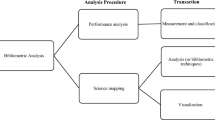Abstract
We present and analyze a life cycle model of a scientific career to investigate how the budget available for research related activities affects a scientist’s long run success in academia. Recognizing that reputation has a positive impact on obtaining research funds as well as on producing scientific output, we determine the optimal efforts of a scientist with respect to applying for research grants and costly science related activities to improve reputation, such as networking and inviting guest researchers, under the assumption that the total extent of these activities is limited by a time budget. We find that the optimal solution is history-dependent and study four different career paths which differ with respect to the initial reputation and the initial financial means to identify the determinants of success and failure in academia. It is shown that the extent to which a scientist finds the results of his or her work rewarding, has a substantial impact on whether the scientist will build up a successful career.






Similar content being viewed by others
Notes
According to Scopus, RFH has co-authored papers with over 140 different researchers (March 2023).
As of August 2023, RFH has over 200 publications with a total of over 21.000 citations according to Google Scholar.
Some of RFH’s most frequent co-authors were initially funded by projects, most prominently Karl F. Dörner.
Note that u(t) includes all kinds of scientific work, i.e., doing research, attending conferences, inviting research partners, etc.
Note that we assume the planning horizon starts at the point where the researcher makes the decision to really pursue an academic career, e.g., at the end of the Master or PhD program. At this point, the researcher might already have built up some reputation due to good grades and early publications.
Non-negativity of H(t) is implied by the non-negativity of u(t) if \(H_{0}> 0\).
In the subsequent we omit time argument t unless necessary for understanding.
References
Ben-Porath Y (1967) The production of human capital and the life cycle of earnings. J Polit Econ 75(4):352–365
Blinder AS, Weiss Y (1976) Human capital and labor supply: a synthesis. J Polit Econ 84(3):449–472
Bol T, de Vaan M, van de Rijt A (2018) The Matthew effect in science funding. Proc Nat Acad Sci 115(19):4887–4890
Cyranoski D, Gilbert N, Ledford H, Nayar A, Yahia M (2011) Education: the PhD factory. Nature 472(7343):276–280
El Ouardighi F, Kogan K, Vranceanu R (2013) Publish or teach? Analysis of the professor’s optimal career path. J Econ Dyn Cont 37(10):1995–2009
Feichtinger G, Grass D, Kort PM, Seidl A (2021) On the Matthew effect in research careers. J Econ Dyn Cont 123:104058
Feichtinger G, Grass D, Winkler-Dworak M (2020) The mathematics of ageing. Cent Eur J Oper Res 28(2):371–399
Feichtinger G, Hartl RF (1986) Optimale Kontrolle ökonomischer Prozesse: Anwendungen des Maximumprinzips in den Wirtschaftswissenschaften. Walter de Gruyter, Berlin
Feichtinger G, Hartl RF, Sethi SP (1994) Dynamic optimal control models in advertising: recent developments. Manag Sci 40(2):195–226
Grass D, Caulkins JP, Feichtinger G, Tragler G, Behrens DA (2008) Optimal Control of Nonlinear Processes: With Applications in Drugs. Corruption and Terror, Springer, Heidelberg
Grass D, Feichtinger G, Kort PM, Seidl A (2021) Why some abnormal problems are normal. Syst Control Lett 154:104971
Haunschmied JL, Kort PM, Hartl RF, Feichtinger G (2003) A DNS-curve in a two-state capital accumulation model: a numerical analysis. J Econ Dyn Control 27(4):701–716
Heffernan T (2021) Academic networks and career trajectory:’There’s no career in academia without networks’. Higher Educ Res Develop 40(5):981–994
McDowell JM (1982) Obsolescence of knowledge and career publication profiles: Some evidence of differences among fields in costs of interrupted careers. Am Econ Rev 72(4):752–768
Merton RK (1968) The Matthew effect in science: The reward and communication systems of science are considered. Science 159(3810):56–63
Novák AJ, Feichtinger G (2022) Accumulation and obsolescence of research knowledge. Central Eur J Oper Res 30:1151–1166
Quetelet LAJ (1869) Sur l’homme et le développement de ses facultés, ou Essai de physique sociale, volume 2
Seidl A, Wrzaczek S, El Ouardighi F, Feichtinger G (2016) Optimal career strategies and brain drain in academia. J Optimizat Theory Appl 168(1):268–295
Stephan PE (1996) The economics of science. J Econ Literat 34(3):1199–1235
Way SF, Morgan AC, Clauset A, Larremore DB (2017) The misleading narrative of the canonical faculty productivity trajectory. Proc Nat Acad Sci 114(44):E9216–E9223
Way SF, Morgan AC, Larremore DB, Clauset A (2019) Productivity, prominence, and the effects of academic environment. Proc Nat Acad Sci 116(22):10729–10733
Author information
Authors and Affiliations
Corresponding author
Ethics declarations
Conflict of interest
The authors have no relevant financial or non-financial interests to disclose.
Additional information
Publisher's Note
Springer Nature remains neutral with regard to jurisdictional claims in published maps and institutional affiliations.
Rights and permissions
Springer Nature or its licensor (e.g. a society or other partner) holds exclusive rights to this article under a publishing agreement with the author(s) or other rightsholder(s); author self-archiving of the accepted manuscript version of this article is solely governed by the terms of such publishing agreement and applicable law.
About this article
Cite this article
Feichtinger, G., Grass, D., Kort, P.M. et al. How Hartl exceeds Skiba: determinants of a successful career in academia. Cent Eur J Oper Res 32, 543–556 (2024). https://doi.org/10.1007/s10100-023-00889-7
Accepted:
Published:
Issue Date:
DOI: https://doi.org/10.1007/s10100-023-00889-7



